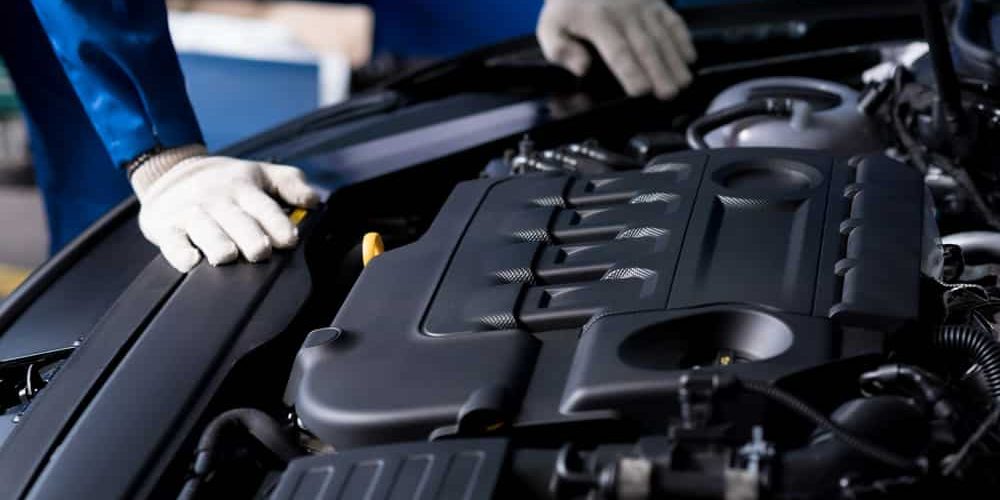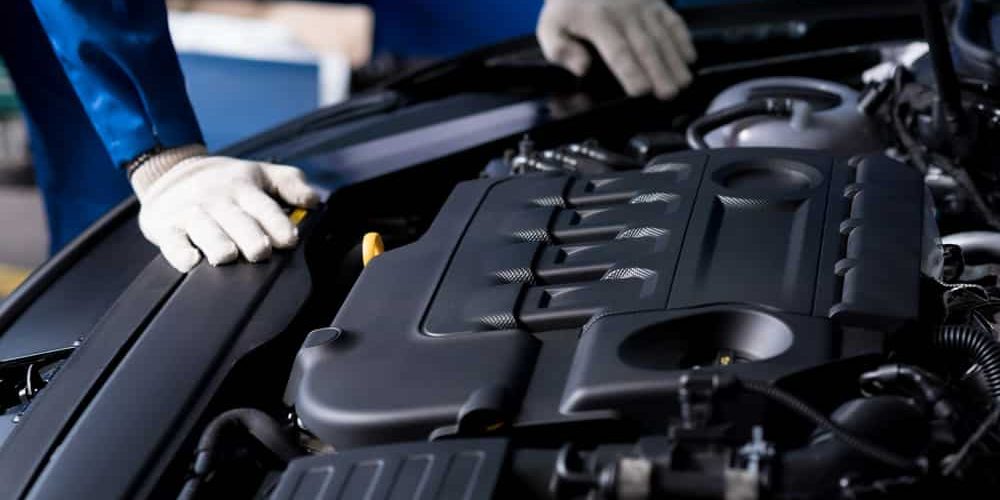Why Is My Car Making A Ticking Noise


Common Causes of Ticking Noise in Cars
To identify common causes of ticking noise in your car, delve into the section that discusses the potential reasons behind it. Low oil pressure, worn lifters, faulty timing belts, malfunctioning injectors, and loose heat shields are some of the sub-sections that will be explored to provide solutions to the problem.
Low Oil Pressure
Insufficient lubrication levels in the engine can result in a ticking noise, indicating a loss of oil pressure. The reduction of oil pressure stresses the engine components and causes them to grind against each other, generating the ticking sound.
As the engine runs, it consumes oil; thus, regularly changing the oil prevents overheating and maintains proper lubrication. Also, listening for any unusual noises, like ticking or knocking sounds, when accelerating can indicate low oil pressure.
It is essential to keep track of your car’s maintenance schedule and get an oil change regularly to prevent significant damage to the engine due to a lack of lubrication. Neglecting regular maintenance may lead to extensive repairs becoming necessary at an expensive cost.
Pro Tip: Check your vehicle’s owner manual for recommended oil change intervals—every 3,000–7,000 miles or every three months is usually advisable.
Worn Lifters
A typical reason for the ticking noise in an automobile engine is due to overused camshaft followers, commonly known as worn lifters. These lifters help maintain the correct pressure between the engine’s moving parts by reducing metal-to-metal contact. As a result of wear and tear over time, they develop a gap and consequently cause the ticking noise.
One of the primary causes of worn lifters is inadequate lubrication, which can happen when engine oil isn’t changed regularly or when using low-grade oil that doesn’t conform to the manufacturer’s specifications. Another potential factor contributing to lifter wear is high mileage. Simply put, engines that have reached more miles or are frequently driven at high speeds can experience this problem.
It’s essential to note that neglecting this issue entirely will cause severe damage to your car’s engine in the long run. Thus, if you hear any excessive clicking or ticking noises coming from under your car’s hood, it’s crucial to seek out a professional mechanic immediately for an inspection before further damage occurs.
Moreover, unusual ticking noises were causing distress for Alex, a newly passed driver with little mechanical expertise in automobiles. To his surprise, while being serviced by professionals at the nearest garage with expert mechanics who helped him identify the problem in no time, “his car had worn lifters.” Consequently replaced and repaired under their supervision, resulting in a trouble-free vehicle and smooth rides henceforth.
Faulty Timing Belt
The timing belt is a crucial component that keeps the engine running smoothly. An irregular tick-tock sound may suggest that the timing belt is faulty or worn out. This disastrous issue can cause damage to your vehicle and put you at risk of a breakdown on the road.
A loose or slipping belt can cause a ticking noise, indicating that the teeth are missing, broken, or damaged. If ignored over time, it can lead to bigger problems, like engine failure. It’s vital to keep an eye on this poorly timed problem, as prevention will save you repair costs in the future.
Ensuring regular maintenance by a qualified mechanic is critical for the early identification of any issues with the car’s components. Proper timing belt scheduling and timely replacements can substantially increase your engine’s lifespan and overall driving experience.
In line with our explanation above, one driver, Sarah, decided to ignore the unfamiliar ticking sound coming from her vehicle while driving home late one night, thinking it was just low oil pressure. Sadly, she experienced severe engine damage while heading to work early the next morning due to a faulty timing belt. It cost her several dollars and headaches trying to repair her vehicle for weeks. Don’t be like Sarah; take care of your car!
Malfunctioning Injectors
Fuel Injector Troubles:
Erratic or noisy fuel injectors can cause ticking noises while driving. When fuel injectors become clogged or damaged over time, the car’s engine struggles to distribute the right amount of fuel. This can result in a ticking sound that follows the rhythm of engine firing.
The usual culprits behind fuel injector problems are debris buildup and corrosion from impurities present in gasoline. Replacing faulty injectors is often necessary for optimal engine performance.
For an effective solution, vehicle owners should periodically maintain and clean their injectors to prevent expensive repairs later on.
Pro Tip: Regular cleaning and maintenance of fuel injectors are essential for smooth engine performance, improved fuel efficiency, and reduced noise levels.
Loose Heat Shields
Loose thermal guards are a common source of ticking noise in cars. These guards are installed in the engine to prevent heat from damaging nearby components.
The following are some reasons for the ticking noise:
- Loose Bolts – Worn-out or poorly attached bolts can make the heat shields vibrate and create noise.
- Corrosion – Over time, these components can corrode, which causes them to weaken and move around leading to the production of unusual noises.
- Damaged shields – Any damage to these guards reduces their effectiveness, allowing them to rub against other parts and produce unwanted sounds.
You mustn’t ignore any sound emanating from your car’s engine compartment, as it indicates an issue that needs addressing. Don’t wait for the problem to worsen before getting it checked by a qualified mechanic.
In case you hear any bizarre sounds coming from your car while driving, do not panic. Rather, take your vehicle to an expert who can apply specialised techniques like re-tightening loose bolts using thread-locking adhesives or replacing damaged components. The combination of both of these methods will effectively minimise or eliminate noise-related issues originating from loose thermal shields. Get ready to break out your detective hat because we’re about to diagnose this ticking time bomb in your car.
Diagnosing the Ticking Noise
To diagnose the ticking noise in your car, as explained in “Why is my car making a ticking noise?” you need to follow a few steps. Start by checking the oil level and pressure, and then proceed to listen for the source of the noise. After that, inspect the engine visually and use diagnostic tools to confirm the issue.
Checking Oil Level and Pressure
One of the crucial steps in diagnosing a ticking noise is to ensure proper oil levels and pressure. Adequate oil lubrication is essential for the engine components to function smoothly and avoid wear and tear.
Here’s a 5-step guide to examining the oil level and pressure:
- Locate the engine oil dipstick and pull it out.
- Clean it thoroughly with a lint-free cloth or paper towel.
- Re-insert the dipstick into its place, wait for a few seconds, then pull it out again to read the oil level.
- If the level is sufficient but unusually dark or gritty, then there might be a contamination issue, and it should be checked by an expert mechanic.
- If the oil level is low, add more oil to bring it back up to the recommended levels as suggested in your owner’s manual.
Remember that low oil levels can indicate underlying issues such as leaks or burning, which need prompt attention from professionals.
It’s necessary to note that using synthetic oils may cause lower oil pressure readings at idle speeds. In this case, check the owner’s manual for recommended viscosity levels.
A valid example: A friend was driving his car when he suddenly heard loud ticking noises coming from under his hood. He parked on the side of the road, thinking about what could have gone wrong. Upon inspection, he realised that he had missed an oil change appointment several weeks before; hence, his car already had low oil levels, leading to poor lubrication and causing those ticking noises.
Listening for the Source of the Noise
To identify the origin of the ticking noise, conduct a thorough audit of your vehicle. Pay close attention to where the sound is coming from and the frequency at which it occurs. Evaluate if it’s more pronounced when stationary or in motion and if any additional factors may be exacerbating the issue. Listen for unusual engine sounds and mechanical issues, such as bent pistons or damaged bearings.
Additionally, check for any visible signs of damage or wear and tear, including loose hoses, bent components, or damaged surfaces. Using specialised diagnostic equipment can aid in locating potential problems that are not readily identifiable to the naked eye. Make sure to pay special attention to exhaust leaks, which can also cause tick-type noises.
One thing to keep in mind is that disregarding ticking noises may lead to serious system malfunctions like engine breakdowns. Take heed of any unusual sounds and take preventive measures as necessary.
In various cases, a ticking noise results from metal parts expanding as a result of being heated during operation; however, in certain circumstances, it may signify something more complex. Consider consulting with a qualified technician who has experience diagnosing issues with your particular vehicle type and model; they will be better suited to identifying potential concerns than the generic advice available on Google searches!
Conducting a Visual Inspection
Analyse the Vehicle’s External Condition
Inspecting the vehicle visually is an essential step in identifying the source of a ticking noise. By examining its external components, you can determine whether any parts are loose or damaged. The primary objective of this inspection is to identify the problem and take appropriate action.
A step-by-step guide to inspecting the vehicle visually:
- Park your vehicle on a flat surface that has plenty of light.
- Open your hood or trunk and check for any visible damage or loose parts.
- Inspect hoses, belts, fan blades, pulleys, battery terminals, and fluid levels for any signs of wear and tear.
- Check each wheel’s lug nuts to see if they’re torqued correctly.
- Check each tire’s air pressure using a gauge.
Avoid overlooking tiny details during external inspections, like tar spots that show possible underbody rust forming or bumper-to-fender gaps that may indicate frame damage.
Suggested Improvements:
If you identify problems during your visual inspection, fix them immediately to avoid additional issues. Replacing belts or pulleys can help resolve ticking noises caused by worn-out drivetrain components. Checking and tightening bolts or screws is also recommended; doing so can remove unwanted noises caused by loose parts rubbing against one another.
Regularly inspecting your vehicle’s exterior condition may help decrease costs associated with emergency repairs in the future by detecting problems before they become more severe.
Using Diagnostic Tools
The use of advanced diagnostic equipment can effectively identify the source of a ticking noise in a vehicle. These tools allow for precise measurements and analysis of various components, such as the engine, transmission, and suspension. With the results from these tools, mechanics can determine the specific issue causing the ticking noise and plan for appropriate repairs.
Additionally, diagnostic software paired with specialised hardware can provide valuable data and even suggest potential solutions based on pre-programmed algorithms. This technology can save time and increase accuracy in identifying and addressing the issue.
It is important to note that proper training and expertise are necessary to effectively utilise diagnostic tools. A skilled mechanic will be able to interpret the readings accurately and diagnose the problem efficiently.
Pro Tip: Regularly scheduled maintenance can prevent ticking noises from occurring by catching potential problems before they develop into larger issues.
Fixing the Ticking Noise
You need to take certain steps to fix the ticking noise in your car. To get the job done, you can start with common solutions like an oil change and a flush or lifter replacement. If the problem persists, you can consider timing belt replacement, fuel injector cleaning or replacement, or tightening or replacing heat shields.
Oil Change and Flush
To solve the ticking noise in your vehicle, it is essential to perform thorough oil maintenance and fluorescent flush. Here’s how to do it:
- Replace the oil filter and drain the old oil.
- Add new engine oil with the suggested viscosity based on the manufacturer’s recommendation.
- Flush the engine with a fluorescent additive compatible with your new engine oil so that any excess debris can be drained out.
- Check for leaks and ensure that everything is properly tightened under the hood before starting your car.
It is critical not to miss this mandatory maintenance task since contaminants tend to accumulate over time and will ultimately cause severe damage if left neglected. Ensuring you stick to a regular maintenance schedule avoids long-term harm, extends the life of your car, and prevents more expensive fixes. Fear of facing significant repair costs can often prompt vehicle owners to overlook preventive measures when keeping their vehicles in tip-top shape. Therefore, never leave Oil Maintenance and Fluorescent Flush for too long!
Lifters Replacement
When it comes to a strange ticking noise in your engine, you might need a “Camshaft Follower Replacement.” Here’s a quick 3-step guide for the same:
- Drain the coolant and remove the valve cover.
- Loosen and remove the camshaft follower screws and replace them with new ones.
- Reinstall the valve cover, add fresh coolant, and check for any other issues.
It is important to note that failing to replace damaged lifters can cause severe damage to your engine over time. It is best to replace them as soon as possible to avoid further issues. For additional assistance, consult with a professional mechanic who specialises in engine repairs.
If you are experiencing engine ticking or clanking noises during acceleration or idle, it might also be helpful to try changing your oil and filter regularly, using high-quality synthetic oil, and making sure your engine is well-lubricated at all times. By taking care of your engine properly, you can avoid future costly repairs and keep it running smoothly for years to come.
Timing Belt Replacement
Replacing the Timing Belt: A Professional Guide
A timing belt replacement is crucial to ensuring the smooth running of your vehicle’s engine. Without regular replacement, it can cause permanent damage to other parts of the engine and result in high repair costs.
Here is a three-step guide to replacing the timing belt:
- Remove the components: Disconnect negative battery terminals and remove any covers blocking access to camshaft sprocket bolts.
- Replace the belt: Replace it with a high-quality belt, tensioner, and idler pulley.
- Tighten fittings: Tighten bolts to manufacturer specifications, install covers removed earlier, and reconnect the negative battery terminal.
It is vital to change timing belts according to manufacturer recommendations, as this depends on different factors such as engine type and mileage.
Always remember that following routine maintenance guidelines significantly extends your vehicle’s lifespan.
Without timely timing belt replacements, you may face severe issues like loss of control or complete engine failure. Keep yourself updated with regular vehicular checkups for early detection of damage.
Consider scheduling an appointment at a trusted auto shop if you are unsure about how to replace a timing belt or need one replaced. Don’t risk safety by neglecting such an essential repair.
Fuel Injector Cleaning or Replacement
Fuel injectors play a crucial role in your vehicle’s performance. When this component starts to malfunction, it can cause the engine to emit a ticking noise, which is not only annoying but also indicative of serious underlying issues. Fortunately, you can resolve this problem by either cleaning or replacing the fuel injectors.
- Fuel Injector Cleaning: Through this process, you can remove superficial dirt and debris that may have accumulated within the injectors. It involves using a specialised cleaning agent and an ultrasonic cleaner to effectively dissolve any clogs in the system.
- Fuel Injector Replacement: If cleaning does not solve the problem, you will need to replace your fuel injectors altogether. This option ensures that no residual impurities remain within the component and provides lasting relief from a ticking engine.
It is essential to note that while fuel injector cleaning may be cheaper than replacement in some cases, it may still require professional assistance. Additionally, if your fuel injectors are beyond repair or severely damaged, replacement is inevitable and should be performed by a qualified technician to avoid further complications.
The importance of maintaining clean fuel injectors cannot be overstated. Dirty or clogged injectors can decrease your vehicle’s efficiency, reduce its lifespan, and lead to costly repairs down the line. Regularly servicing your engine and taking immediate action on ticking noises can help prevent significant damage in the future.
History shows that ignoring ticking noises could lead to disastrous consequences for vehicles. Engine knocks have caused countless accidents worldwide, resulting from engines exploding due to insufficient maintenance practices. Therefore, proper vehicle maintenance practices like fuel injector cleaning or replacement should always be given priority.
Tightening or Replacing Heat Shields
When you need to address the ticking noise in your vehicle, one of the potential solutions is to fix the issue with heat shields. This component is responsible for protecting various parts of your car from overheating and other issues related to high temperatures. Tightening or replacing heat shields can be a reliable way to eliminate the ticking sound and restore your vehicle’s smooth operation.
Here’s a 5-step guide on how to tighten or replace heat shields:
- Locate the faulty shield: Start by identifying which heat shield requires tightening or replacement. You can inspect it visually or listen for any rattling noises while driving.
- Remove the shield: If the problem is caused by a loose or damaged shield, you’ll need to remove it carefully. Use appropriate tools and handle it with care to avoid further damage.
- Clean the area: Once you’ve removed the faulty shield, clean the area thoroughly to remove any debris or buildup that might compromise the new component’s performance.
- Install a new shield: If you’re replacing an old or damaged shield, choose a new component that fits your vehicle’s make and model precisely. Carefully install it in place, ensuring that it’s securely fastened.
- Tighten existing shields: In some cases, tightening existing heat shields would fix the ticking noise. Be careful not to over-tighten them, as this could cause further damage.
Another important consideration is making sure all bolts and mounting hardware are tight but not over-torqued, as this can also cause vibrations resulting in a ticking sound.
It’s always best to seek professional help when dealing with issues related to your vehicle’s intricate components. Heat shielding plays an essential role in preventing overheating and engine damage; therefore, it should be inspected and maintained regularly.
Ensure all parts of your car, including those seemingly insignificant ones like heat shields, receive the necessary maintenance to reduce the likelihood of ticking noise. Don’t ignore potential problems, as they can escalate into more severe issues, leading to costly repairs.
Prevention Tips to Avoid Ticking Noise
To prevent a ticking noise in your car, you can follow essential prevention tips with the help of a regular maintenance schedule, using quality engine oil and filters, driving within recommended limits, addressing issues promptly, and getting professional help and advice. These sub-sections provide possible solutions to avoid ticking noise and ensure smoother running of your car.
Regular Maintenance Schedule
Proper Maintenance Schedule for Optimal Performance
Keeping up with the maintenance of your equipment is critical to ensuring its longevity and optimal performance. Here are some important points to consider:
- Change oil regularly
- Replace air filters as needed
- Clean fuel injectors
- Check spark plugs for wear and tear
- Tighten loose bolts and nuts
- Lubricate moving parts at recommended intervals
It’s of utmost importance to follow these guidelines so that your gear operates efficiently, smoothly, and with minimal ticking noise.
To get the most out of your maintenance efforts, always consult the manufacturer’s instructions and recommendations before starting any work.
Did you know that a proper maintenance schedule can save you a lot of money in repairs over time? Neglecting these simple tasks can lead to major damage down the line. Keep up with them, and you’ll be tracking trouble-free for years to come.
The care you extend to your equipment will return dividends on investment in terms of better operating efficiency, less downtime, fewer repair bills, and smoother operation. So keep these tips in mind and take good care of your gear!
Using Quality Engine Oil and Filters
The right engine oil and filters can prevent those pesky ticking sounds that can be quite annoying. Here’s a guide to ensuring you’re using quality products:
- Choose an oil with the proper viscosity for your vehicle.
- Make sure the filter is compatible with your car’s make and model.
- Follow the manufacturer’s recommended change intervals.
- Avoid using cheap or low-quality products that could harm your engine.
- Consider consulting with a professional mechanic for advice on which brands to use.
It’s also essential to note that using poor-quality products can cause significant damage to your engine, resulting in costly repairs down the line. Achieving optimum performance and avoiding ticking noises requires using high-grade oil and filters.
To ensure your car runs smoothly, it’s crucial to check the oil levels regularly and follow recommended maintenance schedules for both oil changes and filter replacements. It may also help reduce ticking noises by ensuring all components are correctly installed during regular maintenance check-ups.
A colleague recounted how they ignored the importance of using quality engine oil and filters, opting for cheaper alternatives instead. They soon began hearing unusual noises coming from their car, leading to significant engine damage down the line. After much money spent on repairs, they learned their lesson about skimping out on good-quality products for their car’s well-being.
Driving within Recommended Limits
Maintaining Optimal Driving Speeds
To prevent ticking noise while driving, it’s essential to maintain optimal speeds within safe and recommended limits. Keeping an eye on the vehicle speedometer and abiding by the road’s speed limit recommendations can avoid the irregular motion of car parts.
When a vehicle moves too quickly or slows down intensely, the engine is forced to work harder to adjust pace, resulting in loud ticking sounds. Hence, maintaining a consistent speed throughout the drive helps minimise stress on car mechanics and prevents clicking or clunking noises.
Drivers should also be mindful of accelerating slowly from stationary positions. Abrupt starts can lead to sudden load changes on vehicle components like axles, causing unnecessary jerks and leading to internal vibrations.
By staying vigilant towards maintaining uniform vehicle movement within standard limits, drivers can avoid any ticking sound complications from their vehicle while driving.
Car Owner’s Nightmarish Tale
The consistent sound of ticking was present every time Kim drove her car. She even switched off her radio, thinking it would be easier for her ears to hear where exactly it came from. Upon taking the car into a garage one evening after work, she found out that she had been ignoring some vital maintenance steps during her usual service appointments.
The mechanic informed Kim that merely replacing old engine oil had worsened the knocking and made her jeopardise more critical components of her car, which may have led to far-costlier repairs in the long run. From then on, she resolved to maintain regular checkups and stick strictly to a proper maintenance routine that safeguarded critical aspects of an optimised journey, both in terms of performance and comfort.
Addressing Issues Promptly
Timely Attention to the Anomalies
One important aspect of avoiding ticking noise is quickly addressing any issues that may arise in your vehicle. Being proactive can greatly reduce the likelihood of a tick developing and minimise potential damage. By promptly addressing any abnormalities, such as leaks or worn parts, you can prevent small problems from turning into major ones.
Stay Alert and Listen Carefully
Issues that create ticking noise can often be detected by simply listening to unusual sounds while driving. Paying attention to strange noises coming from your car is an important step in preventing further damage. If you notice any ticking or clicking sounds, it is crucial to address them sooner rather than later. Additionally, keeping up with regular maintenance can help keep your engine running smoothly and prevent troublesome ticks from developing.
The Importance of Routine Maintenance
Regular maintenance plays a key role in preventing ticking issues from occurring in the first place. Staying on top of routine oil changes, filter replacements, and other basic tasks helps keep all parts operating smoothly and efficiently. Keeping up with these maintenance items also allows professionals to spot any anomalies before they turn into larger problems.
A True Story
One car owner neglected to address a slight ticking sound coming from under the hood of their car. Over time, the tick turned into a loud banging noise that eventually led to a costly repair bill. The car owner learned the hard way that prompt attention to any strange noises could have saved them both time and money in the long run. By taking diagnostics seriously and dealing with anomalies as soon as they arise, drivers can avoid unexpected repair costs down the road.
Getting Professional Help and Advice
One effective means of addressing ticking noise issues is to seek guidance from industry professionals. Consulting with knowledgeable individuals who have experience in the field can yield tips and advice tailored to the specific needs of your circumstances. Consider reaching out to experts in mechanical engineering or related fields for insight into potential causes as well as practical solutions. This approach can save time spent on ineffective, trial-and-error measures.
Industry professionals may offer different approaches for combating ticking noise, including ways to ensure that the mechanical components of machinery are properly lubricated and tuned. Additionally, they may recommend using specialized tools or replacement parts to further minimize noise levels. Professionals may also suggest modifications that could address any long-term structural concerns that lead to repetitive issues.
It’s important to consider seeking professional help from qualified sources before attempting any DIY fixes. Choosing an inappropriate approach could lead to extensive damage that may permanently impact machine performance. Contacting certified practitioners in your local area will help ensure high-quality results focused on minimizing ticking noise without adding other complications.
Pro Tip: Timely consultation with industry professionals is critical when dealing with machine noise issues, particularly those involving irregular ticking sounds. Their expertise can speed up the diagnostic process and address the issue more effectively than would be possible through trial and error alone.
Why Is My Car Making A Ticking Noise – Frequently Asked Questions
Q: Why is my car making a ticking noise?
A: There are several reasons why your car may be making a ticking noise, including low oil pressure, a worn engine part, or a damaged valve lifter.
Q: Is a ticking noise in my car engine dangerous?
A: It depends on the cause of the ticking noise. If it’s something simple, like low oil pressure, it can be fixed easily. However, if it’s a more serious issue, like a damaged valve lifter, it can lead to engine damage and should be addressed immediately.
Q: How can I diagnose the cause of the ticking noise in my car engine?
A: The best way to diagnose the cause of the ticking noise is to take your car to a mechanic who can perform a thorough inspection and identify the root cause of the problem.
Q: Can I fix the ticking noise in my car engine myself?
A: It depends on the cause of the ticking noise. Some issues, like low oil pressure, can be fixed easily by topping off the oil. However, more serious issues should be handled by a professional mechanic.
Q: How much will it cost to fix the ticking noise in my car engine?
A: The cost to fix the ticking noise will depend on the root cause of the problem. Simple fixes like topping off the oil can be done for relatively little cost, while more serious issues like damaged valve lifters can be expensive to repair.










